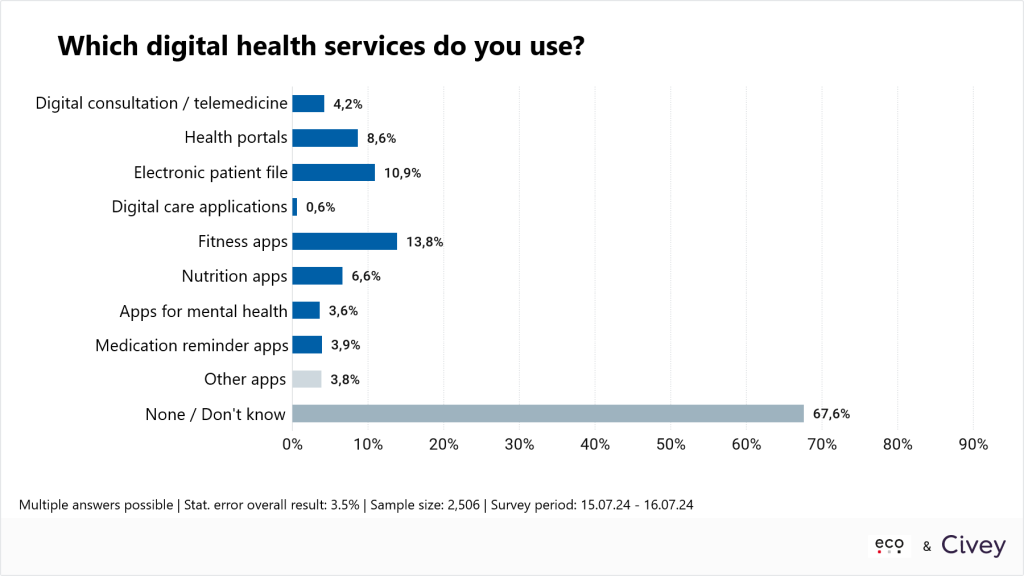eco Managing Director Alexander Rabe: “The German federal government must encourage a new mindset among the population and further catalyse progress so that everyone can benefit from the advantages of digital health services.”
- Almost 70 per cent of Germans (67.6 per cent) do not use digital health services
- Fitness apps (13.8 per cent) and electronic patient records (10.9 per cent) are the most popular e-health services
Digitalisation is advancing rapidly in the healthcare sector, just as it is in many other areas of life. It was only in January of this year that electronic prescriptions replaced their traditional red paper version and, at a regulatory level, the German Digital Act (DigiG) came into force in March, implementing significant digitalisation measures in the medical sector. Despite this, digital healthcare services are only popular with Germans to a limited extent, as revealed by a recent representative Civey survey commissioned by eco – Association of the Internet Industry *.
Official health services are only being used to a limited extent: One in ten Germans (10.9 per cent) use the electronic patient file (ePA), 8.6 per cent use health portals and 4.2 per cent participate in digital consultations. Commercial options for health promotion, such as fitness apps (13.8 per cent) or nutrition apps (6.6 per cent), are also only used in a minority of cases. eco Managing Director Alexander Rabe comments: “The German federal government is driving forward the digitalisation of the healthcare sector with measures such as the Digital Act (DigiG). While this is generally commendable, it also brings challenges.”
The German federal government must address possible hurdles, such as data protection concerns and scepticism towards new technologies among users. As Rabe urges: “There needs to be a major new mindset both in the healthcare system and among patients so that e-health services can be used on a large scale. The federal government, healthcare institutions and stakeholders such as doctors and pharmacists need to cooperate closely and engage in public education.”
Potential of digital health services not fully utilised
According to the survey, younger people in particular have fewer inhibitions when it comes to using official e-health services: While around a fifth (19.6 per cent) of those aged 30-39 use the ePA, only 6.6 per cent of over-65s use this service. The advantages of official digital services in the healthcare sector are undeniable, as shown by the e-prescription, which has been used nationwide since 1 January 2024. Patients receive their prescriptions digitally, which means they don’t have to go to the doctor’s office. The documents are also forgery-proof and enable better interaction between different medical stakeholders.
“In particular, interoperable e-health offerings, which are seamlessly connected and interacting systems, are taking healthcare to a whole new level. This creates numerous opportunities to make the sector more efficient and reduce its workload,” says Rabe. The eco Managing Director emphasises that patients and the various bodies in the healthcare system would benefit equally from digital services.
Federal government must ensure data protection, technical equipment and standardisation
“Digitalisation is not only a technical and regulatory process, but above all a societal one. For all people and institutions to be able to use digital services in the healthcare sector, they must be based on solid foundations. This includes reliable and secure IT equipment and infrastructure, trust and education for users and a clear framework that creates legal certainty,” Rabe emphasises. He calls on the following: “The federal government and healthcare leaders must now establish strong pillars in the e-health sector so that the healthcare system can fully transition into the digital age.”

* On behalf of eco, the market and opinion research institute Civey surveyed 2,506 people in Germany over the age of 18 between 15 July 2024 and 16 July 2024. The statistical error of the overall results is 3.5 per cent.



